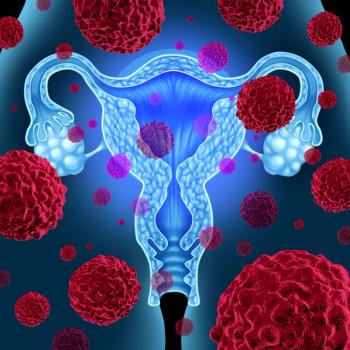
Large Meta-Analysis Links Hormone Therapy With Ovarian Cancer Risk
A large meta-analysis found that women who were users of hormone therapy, even those with less than 5 years of use, had an increased risk of ovarian cancer.
Women who were current users of hormone replacement therapy, even those with less than 5 years of use, were at a significantly increased risk for ovarian cancer, according to the results of a large meta-analysis
Using data from the United Kingdom, the study authors estimated that for 50-year-old women who used hormone replacement therapy for 5 years, about 1 additional case of ovarian cancer per 1,000 users would be diagnosed, and 1 additional death from ovarian cancer would occur for every 1,700 users. For women who used hormone therapy for 10 years, 1 additional case of ovarian cancer per 600 users would be diagnosed, and 1 additional death from ovarian cancer would occur for every 800 users.
“The findings that ovarian cancer risk is greatest in current users of hormone therapy, falls after use ceases, and varies by tumor type, strongly suggest a causal relationship-ie, that among otherwise similar women, use of hormone therapy increases the probability of developing the two most common types of ovarian cancer, and hence ovarian cancer as a whole,” wrote researchers from the Collaborative Group on Epidemiological Studies on Ovarian Cancer.
The meta-analysis reviewed 52 epidemiological studies identifying 21,488 postmenopausal women with ovarian cancer. Looking at only prospective studies, the researchers identified 12,110 postmenopausal women with ovarian cancer; 55% of the women identified had used hormone replacement therapy. Median duration of use was 6 years.
Women identified as ever-users of hormone replacement therapy had a 20% increased risk for ovarian cancer compared with never-users (RR = 1.20; 95% CI, 1.15-1.26; P < .0001).
Women identified as current users with less than 5 years of use had a 43% increased risk for ovarian cancer (95% CI, 1.31-1.56; P < .0001). When the researchers combined data from women with current or recent use, the risk for ovarian cancer was increased by 37% (95% CI, 1.29-1.46; P < .0001).
“The definite risk of ovarian cancer that is observed even with less than 5 years of use starting at around age 50 years is directly relevant to current patterns of hormone therapy use, and hence directly relevant to medical advice, personal choices, and the current efforts to revise UK and worldwide guidelines,” the researchers wrote.
Data showed that this increased risk was similar across both American and European studies. Differences in risk did emerge when the researchers analyzed data across tumor type. Specifically, increased risk was highest among women with the two most common tumor types, serous (RR = 1.53; 95% CI, 1.40-1.66; P < .0001) and endometrioid (RR = 1.42; 95% CI, 1.20-1.67; P < .0001).
Although data indicated that the risk for ovarian cancer decreased the longer ago cessation of hormone replacement therapy had occurred, an increased risk for serous or endometrioid tumors was still identified 10 years after stopping long-duration hormone replacement therapy (RR = 1.25; 95% CI, 1.07-1.46; P = .005).
In an
Given the fact that current recommendations call for use of the lowest possible dose for the shortest duration possible when hormone replacement therapy is necessary, there may still be reason for concern about ovarian cancer risk.
“The study findings did show significant increases in ovarian cancer risk even among current short-term users (median duration 3 years), but a few years after stopping short-term use (after, however, a median of only 1 year of use) the risks were no longer increased,” Wentzensen and Trabert wrote.
Newsletter
Stay up to date on recent advances in the multidisciplinary approach to cancer.














































